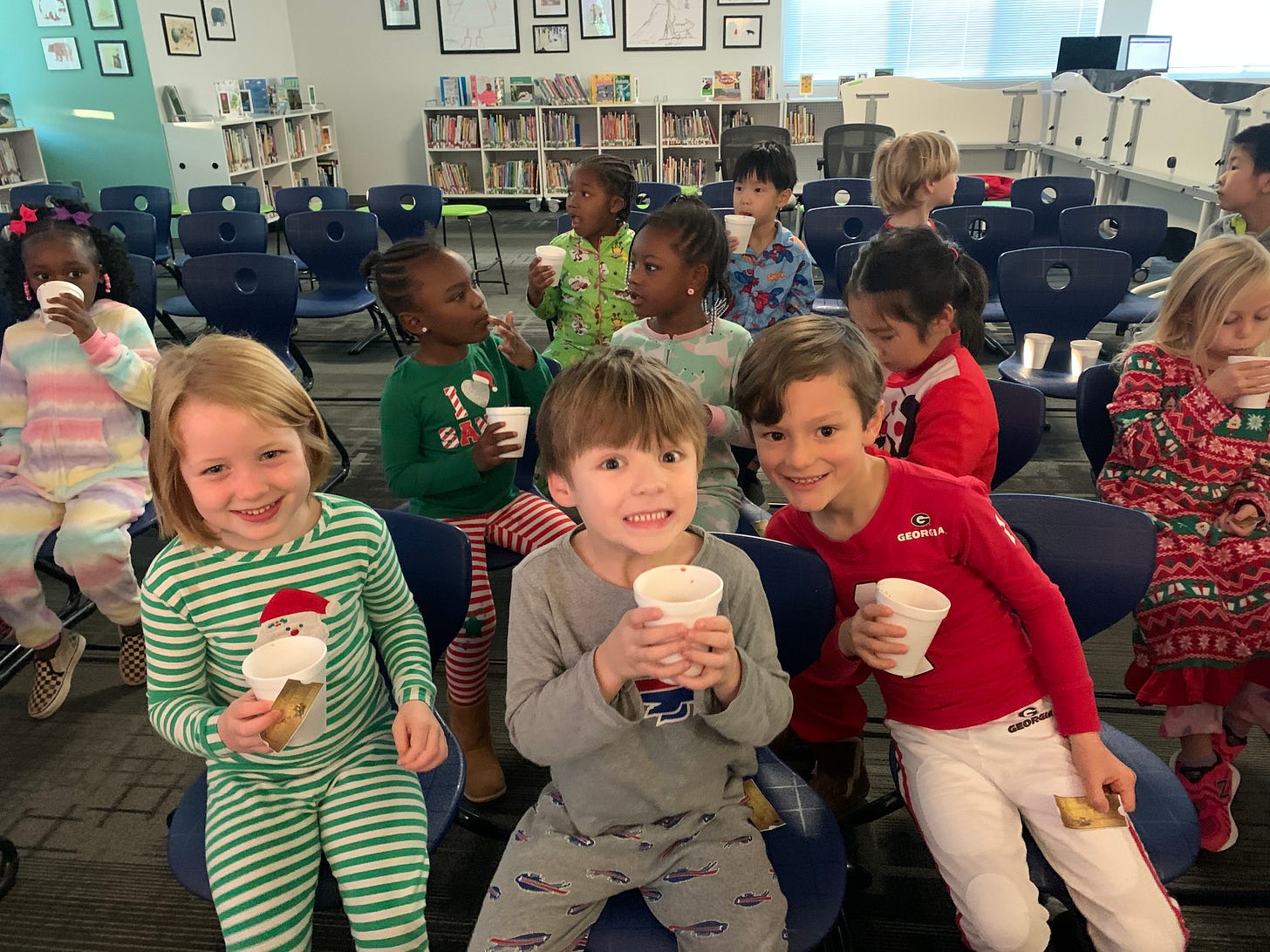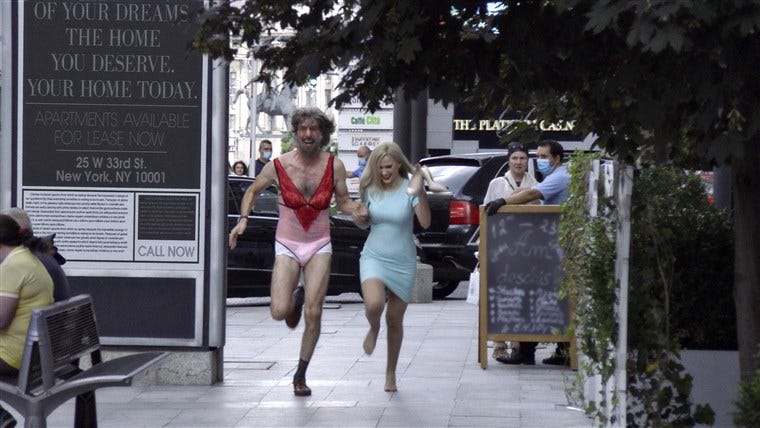Here is a button where you can subscribe to this newsletter now, if you have not previously done so. I do hope that you enjoy it.
Back in January, right before all this, I had dinner in New York with an old friend who’s a few years older than I am. I hadn’t seen him in a while, and in that time, his father had died. His dad had been ill for a long time, and by the time it happened, it was sad and awful but it also felt like a blessing, a relief. We drank too much sake and ended up going down the rabbit hole, and by the end of the evening, he was near tears, but we’d had one of those good, cleansing conversations that you can have, or at least used to be able to have, with true old friends who just need to talk.
I told him how disorienting and debilitating it was to even imagine something happening to my parents, how they have always felt to me, even when they’ve been ill or had some sort of serious injury, essentially indestructible. They’re my parents, you know? In a way, my mother will always be a reservoir of quiet, infinite strength, and my father will always be eight feet tall and able to lift me over his shoulder.
My friend’s face went dark. “Oh, it’s terrible when that changes,” he said.
He said there was a moment, about six years ago, before his father’s most serious illness, when his dad, in his words, just became Different. “It comes at you suddenly, and then it never switches back,” he said. “I don’t know what it is, but it as if, one day, something deep within them just turns off. And they’re not quite the same after that.” It wasn’t even necessarily an age thing, he explained, or a health issue. There’s just a moment, a moment he said he could almost physically feel, that a part of his father, after an extended period of stress and exhaustion, just got too tired to keep up anymore. “He aged about 15 years between two visits, a month apart,” he said. “I’m not sure he even noticed. But I did. He just … tipped.” His father was healthy after he tipped, and they still had many good times together. But an internal rubicon had been crossed. Something inside his dad just got too tired.
We drank more sake, and then I hugged my friend goodbye, and I haven’t seen him since. We’ve emailed a few times during the pandemic. He’s older, and when I see him on social media, frankly, he’s starting to look it. Aged 15 years in a month. We are starting to look it. And eventually we all tip.
*********************
Two weird things have happened to me during the pandemic, physically.
The first is pretty normal: My blood pressure has gone up. My family has a history of heart disease and high blood pressure—my dad was on blood pressure medication in his 30s—so it’s always something I’ve had to keep an eye on. But it’s never been a problem, and it’s never been flagged in a physical or anything. Last month, though, I went to give blood, which is a great habit my mother got me into years ago—there’s actually a Red Cross app that will schedule appointments for you—and is particularly handy during a pandemic when they automatically test your blood for antibodies in case you had Covid but were asymptomatic and never knew it. (This is basically the Covid lottery ticket, and one, alas, I’ve not been able to cash in so far.) After I sat down in the chair and answered all the questions about not having carnal knowledge of any non-human mammals from any non-adjacent continents, the nurse paused while taking my blood pressure.
“Oh, you can’t give blood today,” she said. “Your blood pressure is way too high. We have a maximum number to take people’s blood, and you’re way past it.” It was true. My mother, a retired ER nurse, took my blood pressure when I went over to my parents’ house the next day, and she was actively alarmed. “Your blood pressure is higher than mine or your father’s,” she said. “When did you have your last physical?” I’d actually just gotten a physical in February, and it had gone well; my doctor, who’s my age, actually told me I was inspiring him to start running more.
But that was February. February was a long time ago. A lot has happened since February.
The second physical thing that has happened is a lot stranger: My hair has started turning green.
It was children who pointed it out first. We’re in a little virtual schooling pod here, and the two kids who come over here on Wednesdays and Thursdays started noting it to my sons: Why’s your dad’s hair green? I am notoriously terrible with color—I once returned from a trip in which my office was painted while I was gone and didn’t notice until I was finally informed of it weeks later, and if I’m being honest, I didn’t even really notice then—and just assumed it was something funny going on with the lighting. The people in this house didn’t notice anything either, because they see me every day and you never notice something that’s gradually happening when you see it every day.
But this week, I went to get a haircut, and the woman who cuts my hair said, “Uh, your hair is green. Why is your hair green? It wasn’t green last time you were here.” I told her I hadn’t dyed it or anything, that I was just doing the same thing I always did. We did a little detective work and figured out what was going on. I’ve been using the same shampoo and conditioner for 15 years, which is designed for people with brown hair; it even, I learned this week, has a slight pigmentation element to it, meant to further accentuate the brownness in one’s hair. The problem is when your hair suddenly—over the span of, say, a few extremely stressful months—changes to a different color than brown. The pigment aspect of the shampoo usually mixed with brown to make a sharper brown. But when you mix it with a lighter colored hair, say, a grey or white color … it turns green.
It happened in the span of about two months, a rapid, massive shift in my hair’s natural color—a body responding to external stimuli with shock and rapid transformation. How’s pandemic life going, eight months in? My blood pressure is spiking and my hair has turned green. How’s it going for you?

*******************
The most common observation I hear about the pandemic is how it has confused and disoriented how we experience and determine time. Things that happened in February feel like they happened 50 years ago, and things that happened in April feel like they happened last week. Experiences and concepts that are exclusive to the pandemic—“social distancing,” Carole Baskin, Zoom, curbside pickup, Sarah Cooper, long haulers, Scott Atlas, “super spreading events”—feel like they’ve been a part of our lives since the dawn of time. It is as if we have spent the last eight months inside a sensory deprivation tank as someone outside looks down upon us, coldly amused. It is hard to remember up from down, or even why such distinctions used to matter.
And there is the unquestioned sensation of being stuck. This sense of suspended animation has led to a sort of collective illusion that we hit pause in March, that the world stopped spinning while we dealt, and still deal, with this madness. But it didn’t. These eight months, and whatever months are left to come in this—they have counted. The pages of the calendar kept turning, the sun kept rising and setting, the icecaps kept melting, the clocks kept ticking down. We don’t get to unpause and just snap back. We don’t get a do-over for all this time we’ve lost. This is it. All this time still counts.
Our children are going back for in-person instruction on November 9, and they had a Halloween event this week where kids got to dress up and take a lap around the school. We hadn’t seen most of these kids since the beginning of March, when everyone waved goodbye for spring break, expecting to be back together in 10 days. It was a return to school, a chance to see this normal, wonderful thing that had been left behind and had been waiting for us to come back. The thing was, though, while the school had sat there unchanged, and we all felt frozen in place, everything was now so different. It wasn’t just the masks and the sanitizer and the general awkwardness of everyone. The most vivid thing was that the kids were so much taller. These children, all of whom we were all so used to seeing every day, had not stopped in their tracks when the pandemic began, even if so many of us emotionally did. They just kept going, growing, sprouting upward, absorbing everything that’s happening, adjusting to the world as they now see it, a world that has now been that way for a significant percentage of their lives. Growing like weeds, these kids. They’re already so different than they were when this started. They just keep going.

That picture was taken in December. Every one of those children has a beard now.
It is clear that we will be talking about 2020 the rest of our lives. The thing is, though, when we say things like that, “we’ll talk about 2020 the rest of our lives,” we act as if it will be able to be separated from the rest of our lives, like it was a bad vacation, or a unhappy relationship we were fortunate to eventually extricate ourselves from.
But that’s not what 2020 will be. It will not be a tumor we’ll be able to cut out. It’ll be with us, forever—emotionally, physically, intellectually, a traumatic shock to our collective system. Families have seen their entire foundational structures upended. Careers and business have been wiped away. Kids have grown six inches while staring at their friends and teachers on a computer screen. My hair’s turning green and my heart is pounding out of my chest. The more we go through this, the harder it gets, the farther away the end seems … the less this feels like something to be endured and then discarded, and more, perhaps, the point where it all does in fact tip. We will survive this. We are surviving this. But we are not the same. We are not what we were in March. And years from now, I suspect we will still be changed because of this.
This does not have to be a reason to despair. Enduring strife and struggle can focus the mind, allow us to concentrate our attention on what truly matters, to appreciate each moment while we have them, while we can. I’m going to be proud of the people I care about, of all of us, for making it through this.
But it’s going to scar. It surely already has.
FINAL ELECTION PREDICTION MAP

How’s this look? That looks about right? I know that assuming basic vote tabulation is an awfully optimistic assumption at this point, but … this is assuming basic vote tabulation.
I’d say the most likely state to go from Biden to Trump above there is Florida, and most likely to go from Trump to Biden is probably … Iowa? I’ll say Iowa. Though Texas sure does look intriguing. (Go Beto! Gen X lives, baby!)
I just couldn’t quite get there with Georgia. I know what the polls say. (Some polls say Georgia is more likely to go Biden than Florida is.) But people down here, who have a lot more history with Georgia politics than I do, just can’t quite make themselves pull the trigger on predicting a Biden win. I will begrudgingly follow their lead.
Here is a numerical breakdown of all the things I wrote this week, in order of what I believe to be their quality.
Reliving Election Day 2016, in Real Time, Medium. I went back and read the entire FiveThirtyEight live-blog from Election Day 2016. It was harrowing, but instructive … and even a little hopeful. But mostly harrowing.
My Big Feature on Don Hertzfeldt, GQ. Getting to talk to Don Hertzfeldt was a thrill, and writing a 2,000-word feature on him just the icing on the cake, the cherry on the sundae, the tail on the donkey. (That last one might not be right.)
If Trump Wins, Sports May Stop For a While, New York. I hadn’t even thought about this possibility, but … it makes a lot of sense? Let’s just hope it doesn’t come to that.
After the Dodgers, Who’s the Next Team to Ease Their Fans’ Pain? MLB.com. This is like an abbreviated version of the Tortured Fanbase Rankings. (Which we will be doing.)
Are the Dodgers a Dynasty? MLB.com. They might be? Already?
Tips for Staying Sane in the Week Before Election Day, Medium. I am taking none of these tips.
This Week in Genre History: Saw, SYFY Wire. I will confess a legitimate soft spot for the Saw movies. I am not entirely certain why.
Is It Safe? Sending Kids Back to School, Medium. We are 10 days away from in-person instruction returning here in Athens. We are … ready.
Your World Series Game Five Storylines, MLB.com. I already miss baseball.
Your World Series Game Six Storylines, MLB.com. Sorry, it didn’t occur to me that one of the storylines would be “beloved player gets diagnosed with COVID and then runs out onto the field and celebrates alongside his teammates while not wearing a mask.”
PODCASTS

Grierson & Leitch, we discuss Borat Subsequent Moviefilm, which is great, The Witches and Bad Hair.
People Still Read Books, with Mark Leibovich, who is the greatest and the author of “This Town” and “Big Game.” This is also sort of an unofficial election preview episode.
Waitin' Since Last Saturday, previewing the Kentucky game.
LONG STORY YOU SHOULD READ THIS MORNING … OF THE WEEK

“The Difference Between Feeling Safe and Being Safe,” Amanda Mull, The Atlantic. Amanda Mull goes in depth on basically what I was trying to write about last week.
Also: This is a great FiveThirtyEight primer on the tick-tock of how Election Night might go down.
And here is Anne Helen Petersen being a lot more useful with her current pandemic fatigue than I am currently capable of.
ARBITRARY THINGS RANKED, WITHOUT COMMENT, FOR NO PARTICULAR REASON
World Series of the 21st Century
2011: Cardinals over Rangers
2016: Cubs over Indians
2001: Diamondbacks over Yankees
2002: Angels over Giants
2014: Giants over Royals
2017: Astros over Dodgers
2019: Nationals over Astros
2013: Red Sox over Cardinals
2020: Dodgers over Rays
2009: Yankees over Phillies
2015: Royals over Mets
2010: Giants over Rangers
2005: White Sox over Astros
2004: Red Sox over Cardinals
2003: Marlins over Yankees
2006: Cardinals over Tigers
2018: Red Sox over Dodgers
2012: Giants over Tigers
2007: Red Sox over Rockies
ONGOING LETTER-WRITING PROJECT!
Send me your post-election missives. Write me at:
Will Leitch
P.O. Box 48
Athens GA 30603
CURRENTLY LISTENING TO
“Travelin’ Band,” Creedence Clearwater Revival. I don’t know why, but when I’m stressed out like I’ve been all week … CCR calms me a little? Maybe it reminds me of washing the car in the driveway while Dad worked in the garage. What was classic rock then now reminds me of my childhood. That’s a pretty big indictment of nostalgia right here.
Remember to listen to The Official Will Leitch Newsletter Spotify Playlist, featuring every song ever mentioned in this section.
Get as much sleep as you can this weekend, everyone. You’re gonna need it.

Be safe, everyone. See you on the other side.
Best,
Will



You left out 2008, Phillies over Rays, from your list. I'm guessing that's a way of putting it in last.